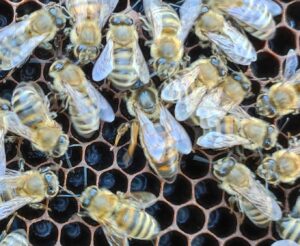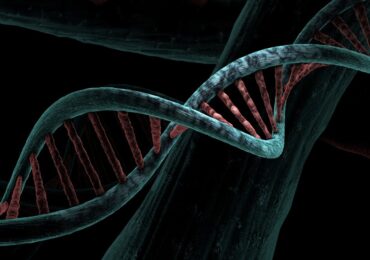In collaboration with experienced beekeepers, we develop bee-friendly techniques to combat bee-related diseases, produce honey and other bee products, and develop genetic material production techniques.
 In addition to the Macedonian breed, we are setting a number of hives belong to the Buckfast breed. Its creator is a German monk and its monastery of origin (Buckfast Abbey) is English. It is a breed that has come from the crossbreeding of other breeds and years of genetic improvement by the monk Adam. Very productive little bee, too calm one would say, desirable for the new beekeeper and does not swarm easily, also important for the new beekeeper because inexperience easily leads to loss of colonies.
In addition to the Macedonian breed, we are setting a number of hives belong to the Buckfast breed. Its creator is a German monk and its monastery of origin (Buckfast Abbey) is English. It is a breed that has come from the crossbreeding of other breeds and years of genetic improvement by the monk Adam. Very productive little bee, too calm one would say, desirable for the new beekeeper and does not swarm easily, also important for the new beekeeper because inexperience easily leads to loss of colonies.
 The beehives are the home of the bee, or rather its artificial home since it does not live in beehives in nature. Our own hives, some of them are made entirely of wood, while the majority of them now consist of a plastic base, a wooden floor (hive walls) and a wooden lid with internal insulation. The plastic base is made of food grade plastic and has a shelf life of ten years.
We believe that this combination is the best possible, because the wooden base is quickly damaged by moisture, rots and becomes a hotbed of various organisms, while its maintenance often requires chemicals that are harmful to bees, and can create a problem for the honey but also in the candle with their presence.
The beehives are the home of the bee, or rather its artificial home since it does not live in beehives in nature. Our own hives, some of them are made entirely of wood, while the majority of them now consist of a plastic base, a wooden floor (hive walls) and a wooden lid with internal insulation. The plastic base is made of food grade plastic and has a shelf life of ten years.
We believe that this combination is the best possible, because the wooden base is quickly damaged by moisture, rots and becomes a hotbed of various organisms, while its maintenance often requires chemicals that are harmful to bees, and can create a problem for the honey but also in the candle with their presence.
Bees
The majority of our bees belong to the Macedonian breed (Apis mellifera macedonica), a very special breed that is found even in Russia and more so in the Balkans: Greece, Romania, Skopje, etc. In our country we find it mainly in Northern Greece. It has a dark coloring and a relatively large proboscis. It maintains large populations even in the winter period while it develops late in the spring. It is a very calm bee, an important element for the new beekeeper without a strong tendency to swarm. It is considered the calmest bee. It is a bee that, if found in the right place, will give us very good productions and will correct many mistakes of the inexperienced beekeeper by itself. In addition to the Macedonian breed, we are setting a number of hives belong to the Buckfast breed. Its creator is a German monk and its monastery of origin (Buckfast Abbey) is English. It is a breed that has come from the crossbreeding of other breeds and years of genetic improvement by the monk Adam. Very productive little bee, too calm one would say, desirable for the new beekeeper and does not swarm easily, also important for the new beekeeper because inexperience easily leads to loss of colonies.
In addition to the Macedonian breed, we are setting a number of hives belong to the Buckfast breed. Its creator is a German monk and its monastery of origin (Buckfast Abbey) is English. It is a breed that has come from the crossbreeding of other breeds and years of genetic improvement by the monk Adam. Very productive little bee, too calm one would say, desirable for the new beekeeper and does not swarm easily, also important for the new beekeeper because inexperience easily leads to loss of colonies.
 The beehives are the home of the bee, or rather its artificial home since it does not live in beehives in nature. Our own hives, some of them are made entirely of wood, while the majority of them now consist of a plastic base, a wooden floor (hive walls) and a wooden lid with internal insulation. The plastic base is made of food grade plastic and has a shelf life of ten years.
We believe that this combination is the best possible, because the wooden base is quickly damaged by moisture, rots and becomes a hotbed of various organisms, while its maintenance often requires chemicals that are harmful to bees, and can create a problem for the honey but also in the candle with their presence.
The beehives are the home of the bee, or rather its artificial home since it does not live in beehives in nature. Our own hives, some of them are made entirely of wood, while the majority of them now consist of a plastic base, a wooden floor (hive walls) and a wooden lid with internal insulation. The plastic base is made of food grade plastic and has a shelf life of ten years.
We believe that this combination is the best possible, because the wooden base is quickly damaged by moisture, rots and becomes a hotbed of various organisms, while its maintenance often requires chemicals that are harmful to bees, and can create a problem for the honey but also in the candle with their presence.



